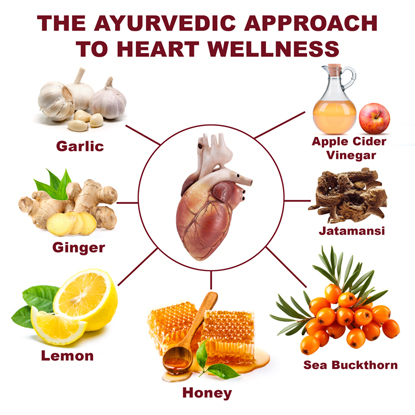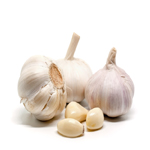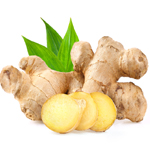Revitalizing Your Heart: Lessons from Ancient Indian Medicine
By Dr. Anjali Agarwal

| Editor’s Note: |
|---|

February is designated as American Heart Month, a time to focus on cardiovascular health and well-being. Cloaking the world in shades of pink and red, our thoughts turn to matters of the heart. Not just the romantic kind, mind you, but the very engine that keeps us going—the tireless pump that sustains our lives. Enter the vibrant world of India, where Ayurveda, the “science of life,” has pulsated for millennia. For centuries, this holistic system of medicine has nurtured a deep understanding of the heart and its connection to the mind, body, and spirit. And within this treasure trove of knowledge lie time-tested remedies waiting to be rediscovered. So, this February, let’s embark on a journey beyond borders, where East meets West in a symphony of healing. Let’s delve into the wisdom of Ayurveda and explore how its simple yet potent remedies can nurture our hearts, not just for a month, but for a lifetime. Raj Shah – Managing Editor |
Healing the heart using natural remedies isn’t a new concept. Throughout the ages, the ancient Indian practice of Ayurveda has offered various effective methods to promote heart health and address various cardiovascular diseases. Let’s delve into the world of Ayurvedic heart care and explore some tried-and-true solutions for healing your heart.
Understanding Heart Care in Ayurveda
 Ayurveda, tracing its roots back to the rich soil of India over 5,000 years ago, has a holistic healing approach that goes beyond merely dealing with physical symptoms. It’s like a beautifully choreographed dance, emphasizing the harmony between body, mind, and spirit. Imagine your heart not merely as an organ but as a grand ballroom, where the energies of life, or “doshas”—Vata (air), Pitta (fire), and Kapha (earth)—need to waltz together in perfect rhythm.
Ayurveda, tracing its roots back to the rich soil of India over 5,000 years ago, has a holistic healing approach that goes beyond merely dealing with physical symptoms. It’s like a beautifully choreographed dance, emphasizing the harmony between body, mind, and spirit. Imagine your heart not merely as an organ but as a grand ballroom, where the energies of life, or “doshas”—Vata (air), Pitta (fire), and Kapha (earth)—need to waltz together in perfect rhythm.
Heart disease, in the Ayurvedic context, disrupts this intricate dance and creates an imbalance among these doshas. The Ayurvedic approach, then, strives to restore this equilibrium, effectively preventing and even curing heart-related ailments. By aligning the rhythm of our physical bodies with our mental and spiritual selves, we can pave the way for a healthier heart and a more balanced life.
Ayurvedic Herbal Remedies for Heart Health
 “Venturing deeper into Ayurveda’s treasure chest of wisdom, we find that the realm of herbs holds numerous secret weapons for heart health. These herbs, armed with potent healing properties, are not only instrumental in preventing heart diseases but are also recognized for their therapeutic abilities.”
“Venturing deeper into Ayurveda’s treasure chest of wisdom, we find that the realm of herbs holds numerous secret weapons for heart health. These herbs, armed with potent healing properties, are not only instrumental in preventing heart diseases but are also recognized for their therapeutic abilities.”
Take Arjuna, for example. This star player in Ayurvedic heart care is lauded for its protective sheath around the heart, believed to fortify the heart muscles. It’s like a personal bodyguard for your heart, warding off potential threats and maintaining optimal heart health.
Garlic, although a common feature in our kitchens, is a powerhouse of medicinal properties. Its roles are multi-faceted; from reducing cholesterol levels to preventing blood clots, garlic takes on the task with gusto, making it a must-have in your heart care arsenal.
Spices and herbs have been utilized to treat a variety of ailments for thousands of years by various cultures. Here are a few of the herbs that help in maintaining the health of the heart.
Garlic
 “Garlic packs a powerful punch for your heart! Its secret weapon: allicin, a compound that lowers blood pressure, improves cholesterol levels, and fights blood clots.”
“Garlic packs a powerful punch for your heart! Its secret weapon: allicin, a compound that lowers blood pressure, improves cholesterol levels, and fights blood clots.”
This potent combo reduces the risk of heart disease, stroke, and even heart attack. Though not a cure-all, adding garlic to your diet alongside a healthy lifestyle can be a delicious step towards a healthier heart
Lemon
 Packed with vitamin C and antioxidants, Lemons may help lower bad cholesterol, combat inflammation, and even manage blood pressure. Studies suggest their flavonoids and fiber reduce heart disease risk.
Packed with vitamin C and antioxidants, Lemons may help lower bad cholesterol, combat inflammation, and even manage blood pressure. Studies suggest their flavonoids and fiber reduce heart disease risk.
Plus, squeezing some sunshine into your water can boost hydration, aiding overall health. Remember, lemons play a supporting role, not a magic cure. Enjoy them alongside a balanced diet and exercise for happy heart health!
Ginger
 Ginger’s fiery charm extends to your heart! Its antioxidants and compounds like gingerol chill inflammation, lowering blood pressure. It may also boost good cholesterol and thin blood, reducing clot risk. While ginger won’t single-handedly conquer heart woes, its daily zing in your food, a cup of tea, or even supplements can be a spicy step towards a heart-happy rhythm.
Ginger’s fiery charm extends to your heart! Its antioxidants and compounds like gingerol chill inflammation, lowering blood pressure. It may also boost good cholesterol and thin blood, reducing clot risk. While ginger won’t single-handedly conquer heart woes, its daily zing in your food, a cup of tea, or even supplements can be a spicy step towards a heart-happy rhythm.
Jatamansi
 Jatamansi’s calming power may shine in heart care. Early studies suggest it could ease stress, a risk factor for high blood pressure. Its potential antiarrhythmic properties might help regulate heart rhythm. Remember, research is limited, and Jatamansi can interact with medications.
Jatamansi’s calming power may shine in heart care. Early studies suggest it could ease stress, a risk factor for high blood pressure. Its potential antiarrhythmic properties might help regulate heart rhythm. Remember, research is limited, and Jatamansi can interact with medications.
Consult your doctor before venturing into this ancient herb’s embrace.
Honey
 While honey boasts antioxidant power, studies suggest it may also play a sweet role in heart health. Its rich polyphenols could help lower bad cholesterol and boost good cholesterol, potentially reducing heart disease risk. Remember, moderation is key, as all sugars, including honey, can contribute to weight gain and other health issues.
While honey boasts antioxidant power, studies suggest it may also play a sweet role in heart health. Its rich polyphenols could help lower bad cholesterol and boost good cholesterol, potentially reducing heart disease risk. Remember, moderation is key, as all sugars, including honey, can contribute to weight gain and other health issues.
Talk to your doctor before adding honey to your heart-healthy diet.
Sea Buckthorn
 Sea buckthorn’s omega-7 fatty acids, like palmitoleic, can lower bad cholesterol, fight inflammation, and improve blood vessel function. Plus, its rich antioxidant mix, including vitamins C and E, combats free radicals that damage heart cells. While promising, research is still underway, and moderation is crucial.
Sea buckthorn’s omega-7 fatty acids, like palmitoleic, can lower bad cholesterol, fight inflammation, and improve blood vessel function. Plus, its rich antioxidant mix, including vitamins C and E, combats free radicals that damage heart cells. While promising, research is still underway, and moderation is crucial.
Consult your doctor before adding this tart berry to your heart-healthy regime
Apple Cider Vinegar
 ACV’s potential perks include lowering bad cholesterol and triglycerides, while boosting good cholesterol. This may reduce heart disease risk, but research is ongoing. Use it modestly (diluted!) – too much can harm teeth and irritate digestion.
ACV’s potential perks include lowering bad cholesterol and triglycerides, while boosting good cholesterol. This may reduce heart disease risk, but research is ongoing. Use it modestly (diluted!) – too much can harm teeth and irritate digestion.
Speak to your doctor before adding it to your heart-healthy routine.
 The list continues to enchant with herbs like Guggul and Brahmi. Guggul steps up to the plate when it comes to battling bad cholesterol, helping to keep it in check and preventing it from rising to alarming levels. Brahmi, on the other hand, takes on a different role. It acts like a soothing balm for your nerves, relieving stress and anxiety, which are often silent saboteurs of heart health.
The list continues to enchant with herbs like Guggul and Brahmi. Guggul steps up to the plate when it comes to battling bad cholesterol, helping to keep it in check and preventing it from rising to alarming levels. Brahmi, on the other hand, takes on a different role. It acts like a soothing balm for your nerves, relieving stress and anxiety, which are often silent saboteurs of heart health.
So, the next time you think of heart care, remember that these Ayurvedic herbs are not just silent spectators but active warriors, providing a strong line of defense for your heart. They combine their unique strengths to work holistically, offering a comprehensive solution for heart health. No wonder Ayurveda has trusted these nature-derived remedies for thousands of years!
The Role of Nutrition in Ayurvedic Heart Care
“Nutrition, a crucial cornerstone of Ayurvedic heart care, deserves its own spotlight. Picture your plate as a vibrant canvas, with each food item a brush stroke contributing to the masterpiece that is heart health.”
Fruit and Vegetable Plate Created By Devi Shah
Starting with the basics, the diet should feature foods abundant in fiber, like fruits, vegetables, and whole grains. Why, you ask? They act as cholesterol regulators, keeping those pesky cholesterol levels in check.
Now, add a generous helping of lean proteins like lentils and lean meats to your palette. They serve as the hearty notes in your heart health symphony, playing a key role in keeping your heart robust and strong.

Don’t forget, your culinary canvas is best kept free from the gloomy shades of sodium and processed foods. Overindulgence in these not-so-heart-friendly foods might just spoil your masterpiece.
Sprinkle your dishes with a pinch of heart-friendly spices like turmeric, cinnamon, and fenugreek. These spices, apart from adding a burst of flavor to your meals, come with a hidden talent. They double up as anti-inflammatory agents and cholesterol fighters, lending their healing touch to your heart.
It’s clear, then, isn’t it? Each meal in the Ayurvedic diet is a well-thought-out, perfectly curated harmony of nutrients that aim to keep your heart dancing to the beat of good health. So the next time you sit down for a meal, remember that you’re not just eating. You’re composing a ballad for your heart, one delicious bite at a time.
Ayurvedic Practices for Heart Care
“While nourishing herbs and nutrient-rich foods act as building blocks for a sturdy heart, Ayurveda further emphasizes the significance of a dynamic lifestyle for comprehensive heart care.”
Picture this: your heart is a powerful engine, and regular exercise is the premium fuel it needs to run at its optimal capacity.
 The ancient practice of yoga stands out as a beneficial ally in this quest. Certain asanas or poses, such as the rejuvenating Cobra Pose, the strength-building Bridge Pose, and the relaxing Savasana, have been particularly lauded for their heart-friendly attributes.
The ancient practice of yoga stands out as a beneficial ally in this quest. Certain asanas or poses, such as the rejuvenating Cobra Pose, the strength-building Bridge Pose, and the relaxing Savasana, have been particularly lauded for their heart-friendly attributes.
And then there’s Pranayama, the ancient art of breath control. It’s not just about inhaling and exhaling; it’s a conscious effort to connect with the life force within you. With each mindful breath, Pranayama aids in easing stress and amplifying heart function, thus playing a melodious tune for your heart’s well-being.
But the Ayurvedic heart care symphony isn’t complete without the serene notes of meditation and quality sleep. Consider them as rejuvenating pauses that allow your heart to catch its breath, recuperate, and prepare for the next powerful beat. They are the silent guardians in the night, helping to keep your heart’s rhythm smooth and steady.
So, while herbs fight their battles and food paints its vibrant canvas, don’t forget to move, breathe, meditate, and sleep—each a potent strand in the holistic web of Ayurvedic heart care. It’s this dynamic interplay of elements that creates the beautiful symphony that is a healthy, happy heart. After all, in the grand scheme of Ayurvedic heart care, every beat matters!
Emotional well-being and heart health
 An essential thread woven into the fabric of Ayurvedic heart care is the acknowledgment of the profound connection between our emotional well-being and heart health. Picture our emotions as a stirring melody, each note resonating with our heart, either in harmony or discord. Ayurveda asserts that emotional stress or turbulence can disrupt our body’s dosha balance, similar to hitting the wrong note, causing our hearts to falter.
An essential thread woven into the fabric of Ayurvedic heart care is the acknowledgment of the profound connection between our emotional well-being and heart health. Picture our emotions as a stirring melody, each note resonating with our heart, either in harmony or discord. Ayurveda asserts that emotional stress or turbulence can disrupt our body’s dosha balance, similar to hitting the wrong note, causing our hearts to falter.
Imagine positive emotions like love, joy, and contentment as the sweet notes that create a melodious symphony with our hearts, thereby promoting their well-being. The serenity felt while strolling through nature, the calm achieved during mindfulness exercises, and the warmth experienced in the embrace of nurturing relationships are all instrumental in tuning our emotional health to the key of heart happiness.
This isn’t merely about blocking out negative emotions, but more about acknowledging them, understanding their source, and cultivating a mindful response. It’s about finding that delicate balance—that perfect rhythm between the highs and lows of our emotional spectrum—and syncing it with the steady beat of our hearts.
But what about those off days when we’re feeling blue and our hearts are playing a sadder tune? Well, that’s where Ayurvedic practices can be a lifeline. They provide us with the tools to channel these emotions productively and foster a healthier emotional state. In essence, Ayurveda advises us to listen closely to our emotional melody and ensure it’s in harmony with our heart’s rhythm.
So, the next time you’re feeling emotionally overwhelmed, remember that your heart is listening. Consider engaging in joy-sparking activities, practicing mindfulness, or simply enjoying the soothing embrace of nature. The key is to remember that your emotional well-being isn’t a solitary note but a significant part of the heart health symphony. And in the grand orchestra of Ayurvedic heart care, maintaining the right emotional balance can make your heart sing the sweetest tune.
About the Author
Dr. Anjali Agarwal is a renowned Indian-American cardiologist and esteemed professor at a prestigious university in the United States. With a passion for blending modern medical science with ancient Indian wisdom, Dr. Kapoor has made significant contributions to the field of cardiology and holistic health. Her groundbreaking research has focused on the integration of Ayurveda and traditional Indian medicine with contemporary cardiology practices. Dr. Kapoor’s work has garnered international recognition for its innovative approach to cardiovascular health, emphasizing holistic wellness, nutrition, and mindfulness. She is not only a pioneer in her field but also a dedicated educator, shaping the future of medicine and inspiring the next generation of healthcare professionals.
























